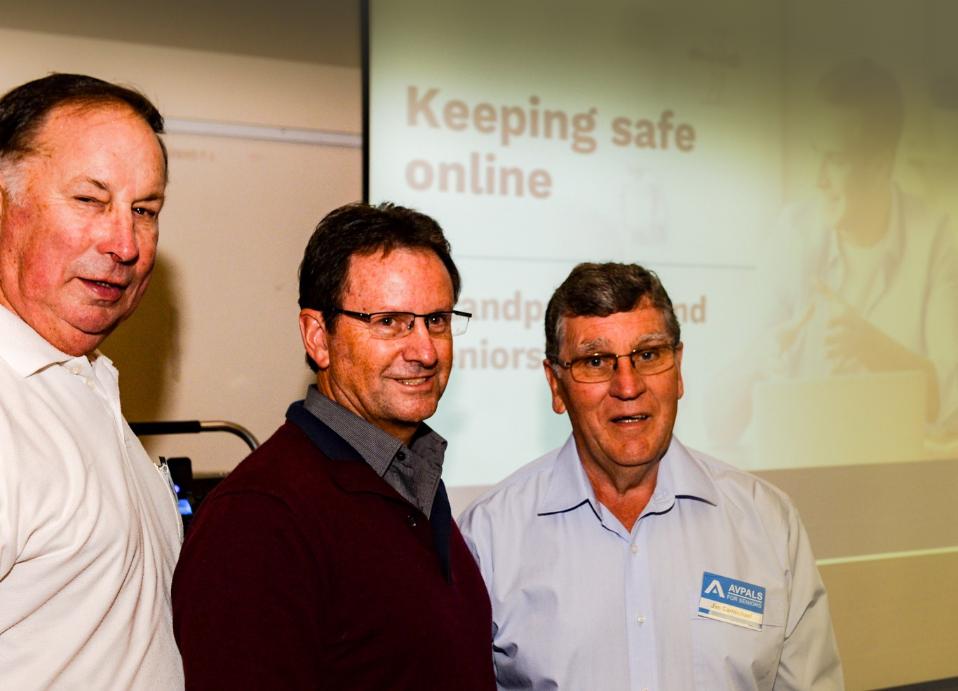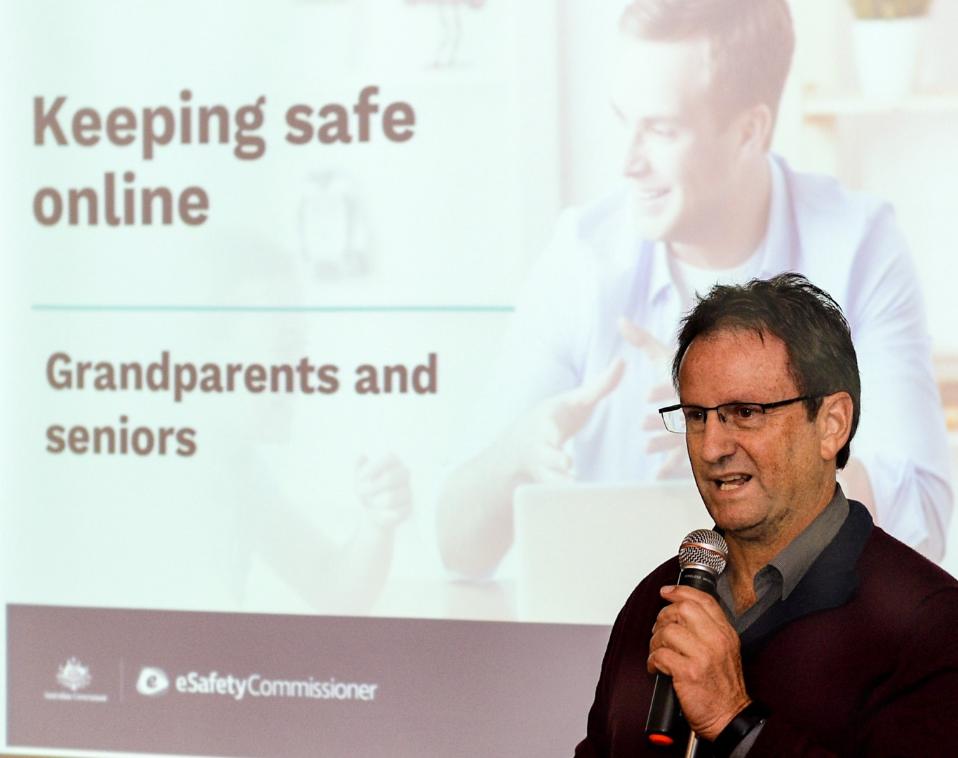AvPals Hosts Illuminating e-Safety Forum on the 'Be Connected' free education website for the online world

Avalon Computer Pals Inc (AvPals) hosted a presentation on Tuesday, June 18th by Greg Gebhart, Senior Trainer for the Office of the eSafety Commissioner.
Mr. Gebhart provided an overview of how people can use technology for enjoyment and how to protect themselves from the risks they may be exposed to through being the targets of scammers.
Pittwater Online reporter and Community Photographer founder Michael Mannington spoke with Greg prior to the presentation:
What is eSafety Greg?
The eSafety commission is part of the Australian government’s commitment to try and ensure all Australians are safe online. Those over 55 years of age are certainly vulnerable to the increasing amount of online scams and what we’re trying to do is educate them in how to keep themselves safe online as well as giving them as grandparents tips on how to look after the grandkids online.
Do you have a Program for this?
Yes, we have developed a special Program called ‘Be Connected’ which encompasses face to face presentations like that we have done today as well as webinars. We also have a large online learning platform which is free for anyone in Australia to go on and learn how to use technology and where people may access information on how to enjoy the experience of the online world and do this in a safe way.
Do you think Seniors are adapting quickly to this program?
Yes. We have kept it modelled on the basics - so it’s not technical, we’ve made sure font sizes are larger so you can see the content. We’ve also developed a lot of resources in different languages as well as made it very visual as older Australians seem to find it more enjoyable and more accessible to learn with visual aids included.
We hear nowadays about more and more scams and even scammers who will go around and knock on peoples doors. How do we keep pace with the varying kinds of scams, especially those that are done through the online portals?
One of the things people can do is go to the e-safety website or Be Connected webpages and read the information about how to manage their technology. There is also scamwatch.gov.au that has a list of the most common scams happening around Australia.
There is also the fact that we have computer clubs like this (AvPals) helping the local community out and providing access to expertise and information if they need it.
Visit: https://beconnected.esafety.gov.au/
Be Connected Topic library Examples include: Essentials
The absolute basics: This course will teach you the absolute essentials of using your device, whether it is a desktop computer, laptop, tablet or smartphone.
Getting to know your device: This course will teach you the basic functions of a keyboard, a mouse and a computer, including how to change settings and manage your files.
Getting started online: Navigating the online world can be a little tricky at first, but this course will teach you some essential skills to getting started online.
Safety first: This course will teach you the essential skills to stay safe online, as well as the why and how of safe passwords, paying for goods safely online, some tips to avoid scams, and how to download and save safely from the internet.
More online skills: In this course, you will learn how to shop safely online and how to connect with friends and family using social networks. You will also learn about how to use a digital camera and how to watch TV or listen to music online.
Connecting to others: This course will teach you how to get set up with the correct equipment to make video calls. It will also teach you about some different ways to make free video calls using applications such as Skype, WhatsApp and FaceTime.
All about data: This topic covers all things data! You’ll learn what data is, how we measure it, how you can buy it and what plans are available. You’ll also read about how data costs vary between your home and mobile, as well as how to manage your phone settings and data when you go overseas.
Wi-Fi and mobile networks: You can connect to the internet without any cables, and we call this type of internet connection Wi-Fi. This course will teach you all about Wi-Fi, which we use when we’re at home or in a place that has free Wi-Fi like a café or airport. You’ll also read about mobile data which we can use anywhere anytime and how it is different from Wi-Fi.
Online hobbies: This topic has courses on some of the fun hobbies you can do online. You can learn how to become your family’s ancestry champion in our first course, Researching family history. We also have courses on the amazing world of Google Earth, Google Voyager and Google Arts & Culture, to whisk you away on a tour of the globe from the comfort of your own living room. Finally, we have a course on how to write your first blog (short for web log, or online journal), to enable you to share your hobbies and interests with friends, family and the community at large.
All about apps: This topic takes you into the world of apps (short for ‘Applications’, or computer programs). They are the amazing little programs that do a lot and help us use our smartphones, tablets and even laptop and desktop computers. Learn about the kinds of things you can do with apps, where you can get them, and how you can be safe when using your apps.
Games centre: Designed for use on a laptop or desktop computer, test your memory or tease your brain while honing your keyboard and mouse skills. There are crosswords, memory games, spot the difference, word ‘drag and drop’ games and trivia questions to enjoy. Are you ready for a challenge?
Practice area: This area is designed for those using a laptop or desktop computer, and want to build their mouse and keyboard skills. We tackle the most common challenges when using computers, and you can watch the demonstration videos, practise your skills in a safe environment, and then download the printable guides to refer to later.
Apple iPhone: Getting started - This topic shows you how to set up your new or pre-owned iPhone safely, and shows you step-by-step how to customise your phone to suit your needs. Essential viewing for anyone who has a brand new or pre-owned iPhone, each course has a video guide to follow and tip sheets to print and keep.
Android Phone: Getting started - This topic shows you how to set up your new or pre-owned Android phone safely, and shows you step-by-step how to customise your phone to suit your needs. Essential viewing for anyone who has a brand new or pre-owned Android phone, each course has a video guide to follow and tip sheets to print and keep.
Apple iPad: Getting started - This topic shows you how to set up your new or pre-owned iPad safely, and shows you step-by-step how to customise your iPad to suit your needs. Essential viewing for anyone who has a brand new or pre-owned iPad, each course has a video guide to follow and tip sheets to print and keep.
Android tablet: Getting started - This topic shows you how to set up your new or pre-owned Android tablet safely, and shows you step-by-step how to customise your Android tablet to suit your needs. Essential viewing for anyone who has a brand new or pre-owned Android tablet, each course has a video guide to follow and tip sheets to print and keep.
The Online Safety, Start the Chat campaign is about helping everyone in a child’s life to have a conversation about online safety.
The youngest generation of children are the first to grow up in a fully connected digital world – for them, the online world is now just as much a part of their lives as the offline world.
With technology changing so fast, it’s important to be proactive and talk about online safety early and often.
Everybody can play an important role in helping children and young people to have positive and safe online experiences – including parents, teachers, carers, siblings, grandparents, mentors and sports coaches.
If you feel unsure about how to talk to kids about online safety, you’re not alone. eSafety has a range of tools, tips and resources to help have that conversation – whether it’s today, tomorrow or in the future.
Visit: https://www.esafety.gov.au/
